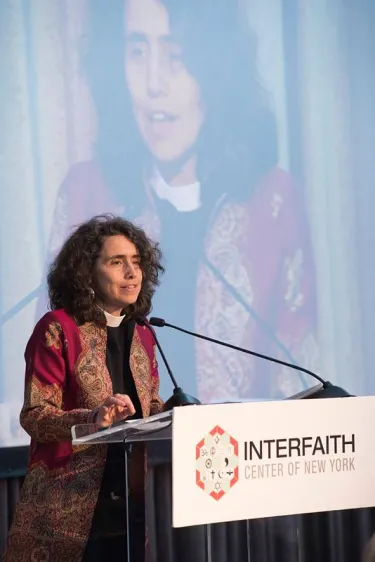Stony Point Center closes its 75th celebration with worship
Following the service, worshipers head outside to walk the site where a memorial grove is planned

LOUISVILLE — Closing worship on Sunday, which capped off Stony Point Center’s 75th anniversary and its one-day Social Justice Summit, included preaching by the Rev. Dr. Chloe Breyer, executive director of the Interfaith Center of New York since 2007.

Breyer used James 2:14-18 and Micah 6:6-8 as her preaching texts, especially the latter.
Breyer recalled how in the years before the Covid pandemic, ICNY would hold its social justice retreats at Stony Point Center. She called those retreats “a chance for us to bring together so many faith leaders from so many backgrounds on shared social concerns, which is how the Interfaith Center has done the work that we do — not so much in the dialogue among the hierarchy of our faith traditions, but really grassroots, on-the-ground faith leaders coming together around issues” including health care, poverty and fighting hate.
Turning to the Old Testament text, Breyer labeled Micah “the man of the hour.”
“He really has come into his own at this point in our country’s history,” she said, despite there being “a great distance” between the 8th century BCE and today. Micah joined fellow prophets Isaiah, Hosea and Amos, “all trying to speak a word of truth into a society that did not want to hear that.”
Micah has “specific axes to grind,” Breyer said, including the corruption of both religious authorities and the ruling class, “specifically the greedy landowners who are taking the land of the poor.”
“I wonder if there’s been a time when the words of the prophets — specifically the complaint they have against the greed and corruption of the governing class and the political authorities of Judah — has ever ben as true and as closely resembling the current political arrangements of the United States?” Breyer asked. “This whole situation of unaccountable authority would have been familiar to Micah.”
In this context, we have to ask: just what is required of us? “The question that Micah poses to his people … can also be asked of us,” Breyer said.
“We start from where we are, whether we are citizens or not citizens, whether we are Democrats or Republicans. We all start from where we are,” she said. “You faith leaders are doing such important work in your congregations, and you have a role in the public square, too. That’s something for all of us to remember.”
Zachary Brook Bouder Pindar offered a reflection based in part on the poem “Our Deepest Fear” by Marianne Williamson:
"Our deepest fear is not that we are inadequate.
Our deepest fear in that we are powerful beyond measure.
It is our Light, not our Darkness, that most frightens us.
We ask ourselves, who am I to be brilliant, gorgeous, talented, fabulous?
Actually, who are you not to be?”
The poem concludes with these words:
“As we let our own Light shine,
we consciously give other people permission to do the same.
As we are liberated from our own fear,
our presence automatically liberates others."
After some music, Stony Point Center co-directors Chelsea deLisser and Brian Frick talked about the planned memorial grove, which is supported by seed money from longtime supporter Jane MacDonald.
“Jane said, ‘I want to help fund a memorial grove garden on this campus.’ We thanked her for answering our prayers,” deLisser said. “This will be a space where we can honor all of these folks together in a way that maintains itself without having to remember every other day to turn the water on and off. A huge thanks to Jane.”
Frick put in a good word for both MacDonald and the Rev. Don Byers, “amazing supporters of this place.” He said Stony Point Center staff members are compiling a “list of trees the deer don’t like.”
“As we walk over” to the site of the future memorial grove, “think of the intention you’d love to put into this garden,” deLisser suggested. A shovel was positioned on site. “If you feel inspired,” deLisser said, “help us to dig this garden.”
Frick reminded those in worship the weekend started with a theme based on a Mexican proverb: “They tried to bury us. They didn’t know we were seeds. That’s what we need to remember. They can try to bury us, but we’re seeds. Let’s grow.”
Learn more about Stony Point Center here.
You may freely reuse and distribute this article in its entirety for non-commercial purposes in any medium. Please include author attribution, photography credits, and a link to the original article. This work is licensed under a Creative Commons Attribution-NonCommercial-NoDeratives 4.0 International License.




